The Boy They Couldn't Kill: How Rae Carruth's son survived and thrives

In honor of Sports Illustrated's 60th anniversary, SI.com is republishing, in full, 60 of the best stories ever to appear in the magazine. Today's selection is "The Boy They Couldn't Kill," by Thomas Lake, which ran in the Sept. 17, 2012 issue.
Thirteen years ago, NFL receiver Rae Carruth conspired to kill his pregnant girlfriend and their unborn son. The child has not only survived but thrived -- thanks to the unwavering love of his grandmother.
The English language has a million words, but only one for the two kinds of forgiveness. This is a major failure. The two kinds may be similar at the molecular level but they are far removed in magnitude. Like a candle flame and a volcano, an April shower and a hurricane, a soft tremor beneath your feet and the great San Francisco earthquake.
The first kind of forgiveness is the easy kind. Someone wounds you, and in time this offender comes to see what he has done. He returns to lay the crime at your feet. And when you reach down to pull him up a sort of charge passes between you, a cleansing force that refreshes both souls.
Candle flame and volcano. The second kind of forgiveness is a rare occurrence that becomes rarer as the crime grows more severe. In this case the offender gives nothing. He never comes to you. And when you go to him, he turns you away. This leaves you alone with your open wound and a solitary choice. No one will blame you either way. But the wound is yours to keep, or let go, and that choice may plot the course for the rest of your life.
One night 13 yearsago a wound was opened in the dark, in a place deep in the abdomen that surgeons call the seat of the soul. The wound was a subterranean river, and it was not closed off until there was no more blood to lose. Professional athletes have done many terrible things over the years, but this was probably the worst. An unborn boy lay in the dark near the rising lake of his mother's blood, and soon he would join her on the brink of death.
SI 60 Q&A: Thomas Lake on the power of forgiveness
The mother had a mother, and this story is about her. She came from the Piedmont of North Carolina, with its valleys full of corn and cotton, and her people were good and prosperous. You can go to Kings Mountain today and find Jack Adams Road, named for her father. He was one of six brothers who sang in a gospel group and worshipped in a redbrick edifice called Mount Olive Baptist Church. You can go to this church today and see the place where Saundra Adams grew up. That is her name. Saundra Adams. What she learned at Mount Olive was an overwhelming sense of gratitude for life. The sense that you don't wake up unless God opens your eyes, don't see the rising sun unless God pulls it from the horizon, don't put food in your mouth unless God helps you hold the fork. And you do all these things and you rejoice.
Saundra was 16 when she and a boy gave in to their desires, and she was 17 when Cherica was born. About to start her senior year in high school. Saundra's father was plowing his cornfield when she went into labor, and he wanted to finish, so they were late to the hospital. There Saundra was in the backseat of that Chevy Caprice, trying to hold Cherica in, and Cherica kept coming, and Saundra kept holding, and Cherica kept coming, and from the day she was born to the day she died she had a bald spot on top of her head about the size of her mother's fingertip.
Pro athletes have done many terrible things over the years, but this was probably the worst.
It was 1975 in rural North Carolina. A girl in this situation was expected to move away or at least quit school. But they were Adamses, hardworking, successful, and her mother and father expected her to graduate. They would help with the baby. They were disappointed by her reckless behavior, but Jack was thrilled for another chance to sustain the Adams bloodline. He took Cherica riding on his tractor and told her she would have many children.
After graduation Saundra's parents said, Go on to college. Make something of yourself. We'll keep Cherica. You can see her every weekend. So Saundra did. She got a psychology degree from UNC-Charlotte and a good job in personnel at IBM. And she brought Cherica to Charlotte to grow up.
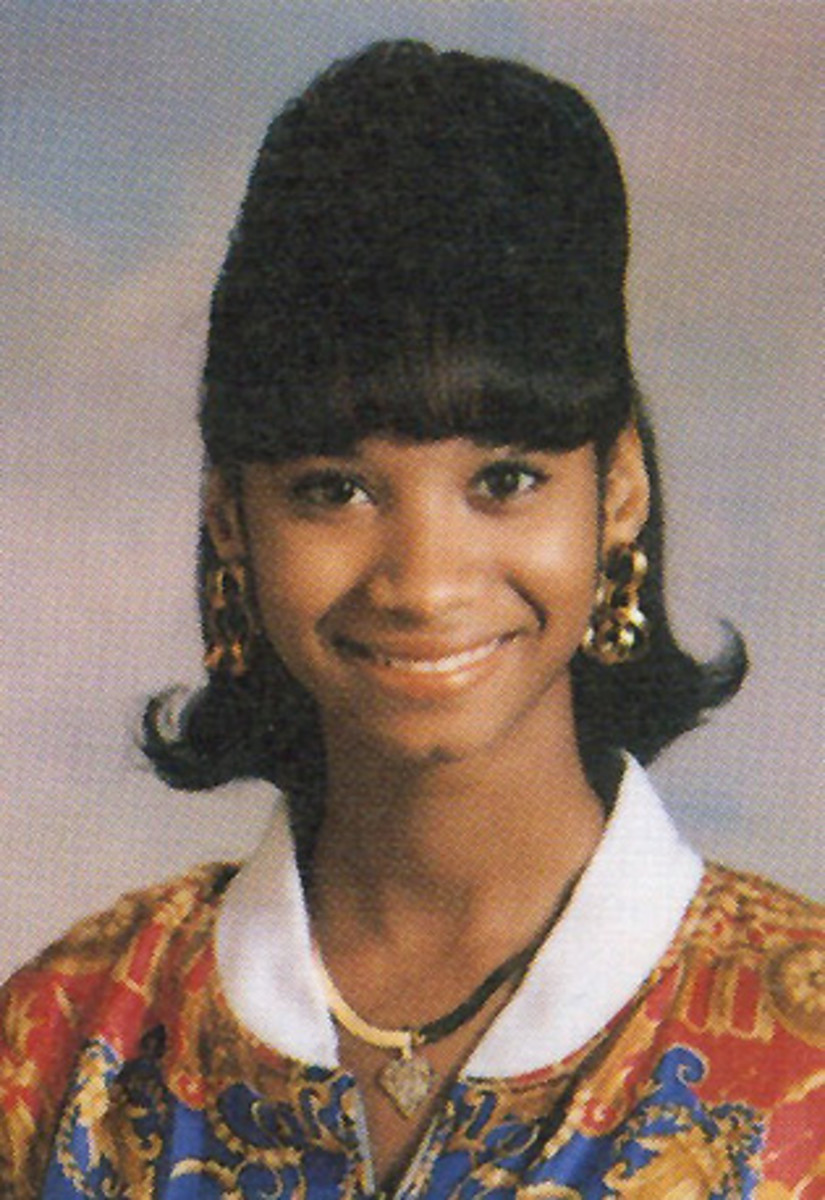
Cherica grew up fast, and soon she was living a fast life. She had these deep brown eyes and this willowy frame, and the men took note. She modeled in clothing advertisements and sold real estate. She earned enough to buy a black BMW and a red Mitsubishi coupé. She danced at the Diamond Club and ran in the circles of the newly rich. She mingled with the Hornets and the Panthers, and one day at a barbecue in the summer of 1998 she met a young wide receiver named RaeCarruth.
What did Cherica Adams know about RaeCarruth? He certainly looked like a good catch. Even Saundra found him handsome and charming. Five-foot-eleven, 194 pounds; strength of a running back, speed of a sprinter. He had come out of a rough neighborhood in Sacramento without a mark on his record. At Colorado he was perhaps the best deep-route receiver in college football, but he saw himself as an intellectual. He was the Panthers' first-round draft pick in 1997, and he had the talent to be a superstar if he could just stop getting injured. If football didn't work out, he could fall back on writing novels, writing screenplays, directing films.
"A self-described daydreamer, he's constantly scripting stories that he later tests on teammates," Vicki Michaelis of The Denver Post wrote of Carruth in 1995. "His favorite right now is one he's titled Acceptance. An alcoholic father causes the death of his All-American son in a car accident. He and his wife later have two more sons, one who is mentally handicapped and another who is gay. For the ending, wait for the movie."
Here are some other things about RaeCarruth that might have helped Cherica Adams, had she put them together soon enough. He had never really grown up. He played the victim in predicaments of his own making. He already had a four-year-old son back in California, and he had never sent the boy a birthday present. He provided no child support until the mother took him to court. Even then, after a judge issued a temporary order requiring him to pay $5,550 a month, he met with the mother and she agreed to accept just over half that amount on condition that he be a better father. Spend more time with the kid. And after he had failed to do that, according to her testimony, she called him and they had a spirited discussion and he told her not to be surprised if she got into a fatal car accident.
Then he said he was only joking.
Meanwhile he had moved on to another girl. There were always plenty to choose from. He was almost 23, and she was a 17-year-old high school student in Colorado. He plied her with money and clothes and a Lexus. Later, when she told him she was pregnant, he told her she couldn't have the baby. She later testified that he said, Don't make me send somebody out there to kill you.
She got the abortion.
These things all happened before April 1999, when Cherica Adams made her choice.
*****
Although her lifestyle may have suggested otherwise, Cherica was in some ways an old-fashioned woman. Her grandfather's words had stayed with her. She wanted a wedding, a husband and many children. A whole football team, she used to say. Once she and her mother watched a movie in which a woman couldn't have children, and her mother, through modern technology, carried the child for her daughter and gave birth to her own grandchild.
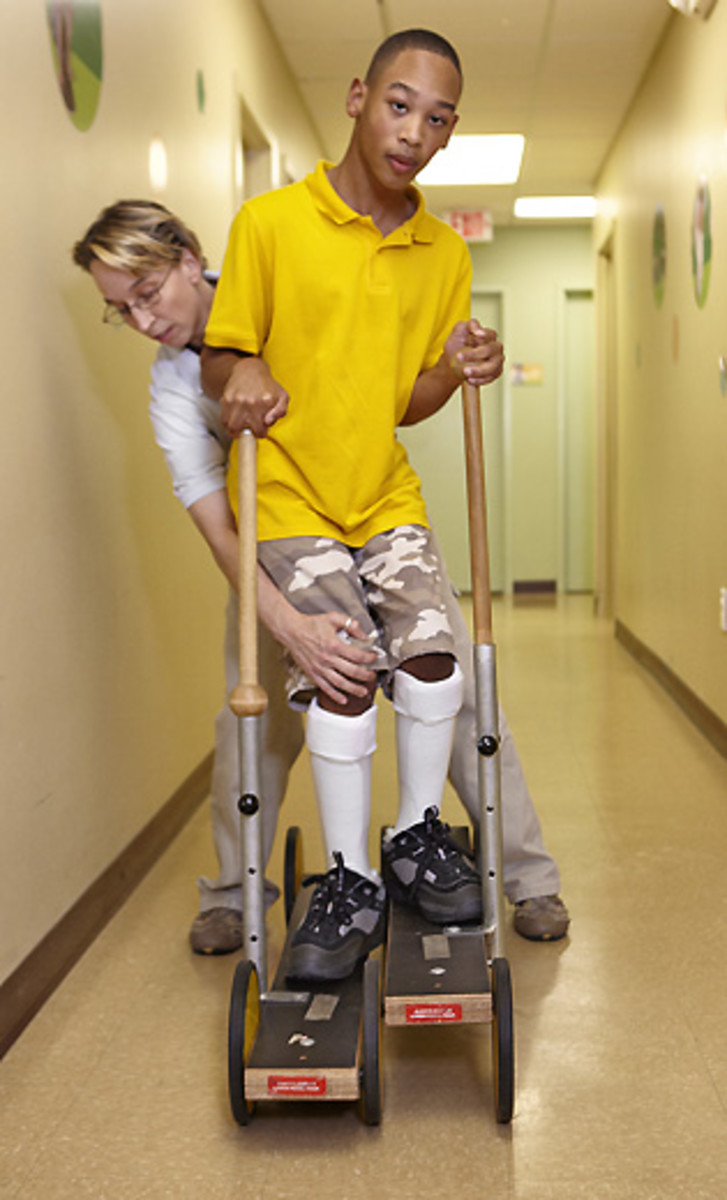
would you do that for me?
Girl, yes, Saundra said.
It was Mother's Day 1999 when Cherica gave Saundra the news. You don't have to carry it for me, she said. I'm gonna have my own.
Cherica was thrilled about her unborn son. She read My First Bible out loud and immersed him in the music of Bach and Beethoven. And although Saundra rejoiced with Cherica, because she saw every life as a gift from God, she knew it would be complicated. Cherica wanted to give the baby the Carruth name, but her mother was against it.
If you're not married when the baby comes into this world, Saundra said, he needs to be an Adams.
RaeCarruth didn't want him to be anything. True to form, he told Cherica to get an abortion.
She refused.
Carruth's life was quickly diverging from the script. After making the NFL All-Rookie team in 1997, when he led all first-year players with 44 catches, for 545 yards, he had missed most of the '98 season with a broken right foot. He felt shunned by his Carolina teammates and stayed home alone, playing football on his PlayStation. He planned to come back stronger than ever in '99, but in September he was benched for part of the game after dropping a crucial pass in a two-point loss to the Jaguars. In mid-October, against the 49ers, he suffered a left-ankle sprain that would keep him out for a month. Another season was derailed. His career was going nowhere. And now another woman would soon be demanding child support.
Carruth knew a guy called New York and another guy called Little Man. New York weighed 286 pounds and would do anything for money and plenty of things for free. He had once stood on a roof for several hours, throwing glass window panes down at the police. He had once set a fellow prison inmate on fire. Little Man was not so frightening, but he knew his way around a gun and a crack deal. For someone who wanted to solve a problem outside the law, New York and Little Man appeared to be useful men.
Cherica went to a childbirth class, and Carruth went with her. New York later testified under oath about that. He said Carruth told him to meet them after the class and beat up Cherica and make her lose the baby. But New York didn't show. He was nothing if not a con man, so he strung Carruth along. One time New York agreed to find Cherica at her apartment and kill the kid there. Another time he was going to ambush her behind a restaurant. He took cash payments of $300 and $2,000 and kept delaying. Finally, they settled on a plan to murder Cherica.
On Nov. 15, 1999, when Cherica was about seven months pregnant, she got a call at her apartment. Carruth wanted to take her to the movies. Cherica fired up the BMW and drove to his house.
From there, she called her mother. Strange men were coming and going. She saw an odd transaction that involved bootleg satellite television. Something's not right, she told Saundra. I don't know why I'm even here.
Just cancel the movie, Saundra said. Tell him you're not going. You're just gonna leave.
Saundra stayed on the phone with Cherica and heard her repeat these things to Carruth. And she heard Carruth talk her daughter back into going.
No, no, no, he said. I'm going. I'm leaving right now. Let's get your things. Let's go to the car.
And they got in his tricked-out white Ford Expedition and headed off to the Regal Cinemas for a late screening of The Bone Collector, with plans to return to Carruth's house afterward.
Cherica's roommate later testified that around midnight she got a phone call. Cherica was heading home. Carruth was coming with her. This was a total surprise. Cherica had left the apartment in disarray. She asked the roommate to straighten up her bedroom. A prosecutor would later say this change of venue was a crucial part of Carruth's plan.
It was 10 miles north from his house to Cherica's apartment. He drove the white Expedition, and she followed in the black BMW. Behind her was a gold Nissan Maxima that contained Little Man and New York.
Rea Road is one of the prettiest drives in metropolitan Charlotte. Going north from I-485, it's a winding four-lane avenue divided by a tree-lined median. You cross a bridge over Four Mile Creek, and at Pineville-Matthews Road you can see the breathtaking crown-shaped sanctuary of Calvary Church. From there the road narrows to three lanes, then two, and it slopes down to a hollow that's secluded on both sides by trees and underbrush. There, at about 12:30 a.m., RaeCarruth came to a sudden halt.
Cherica hit the brakes.
The gold Maxima pulled around and stopped on her left.
She was trapped.
New York had a Charter Arms five-shot .38 Special revolver, and he emptied all five rounds into the BMW. The Expedition pulled away, taking Carruth to a friend's house to play video games. Little Man turned the Maxima around in a driveway and headed south. But as he sped up the hill and saw the lonely hollow receding in the rear-view mirror, he caught a glimpse of the BMW's brake lights flashing red in the dark. And he knew they had left the job undone.
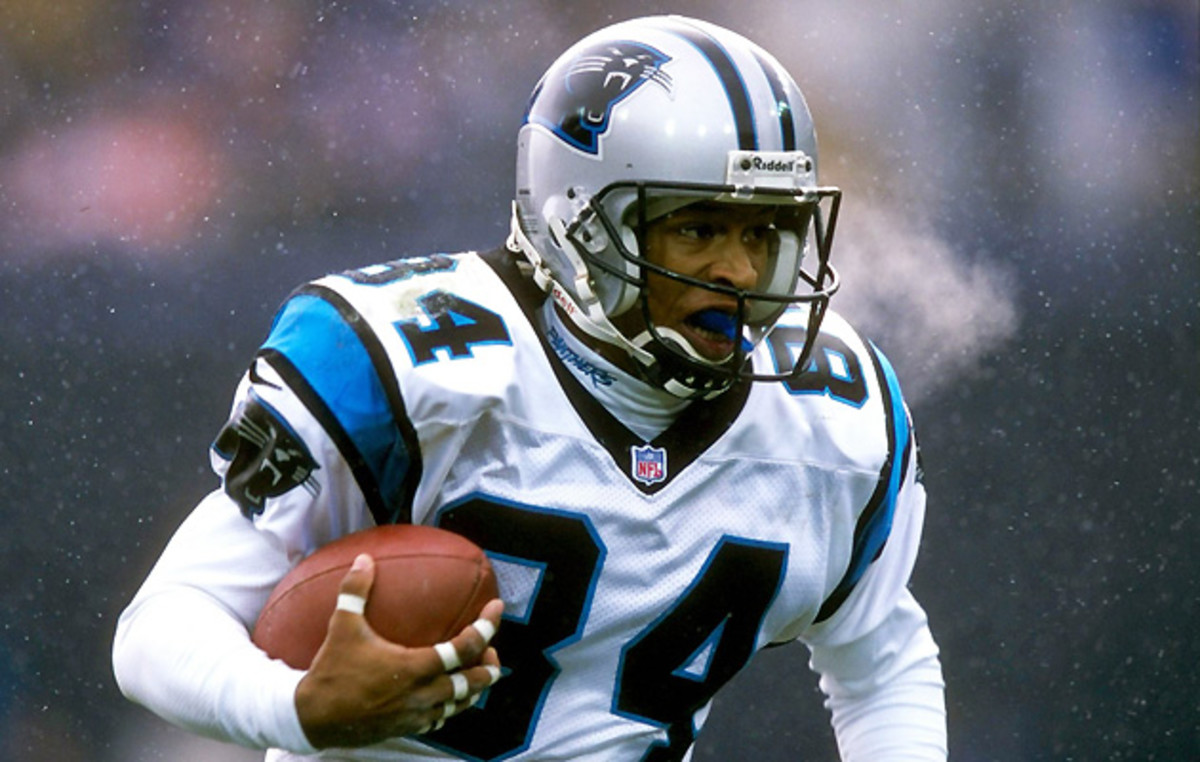
*****
At 12:31 that morning, a wireless phone call was placed to the Mecklenburg County 911 dispatch center. The recording is 12 minutes and six seconds long. It is the sound of a woman dying.
DISPATCHER: 911 Baker. Do you need police, fire or medic?
CHERICA ADAMS: Police. I've been shot. I've been shot.
Between deep breaths and moaning, and honking her horn to seek help from local residents, Cherica described her vehicle, her wounds and her precise location. She also said the words that would send RaeCarruth to prison.
MEDIC: O.K. How did this happen?
CHERICA: I was following my baby's daddy, RaeCarruth, the football player.
(A few questions later)
CHERICA: He was in the car in front of me and he slowed down and somebody pulled up beside me and did this.
MEDIC: And then where'd [Carruth] go?
CHERICA: He just left.
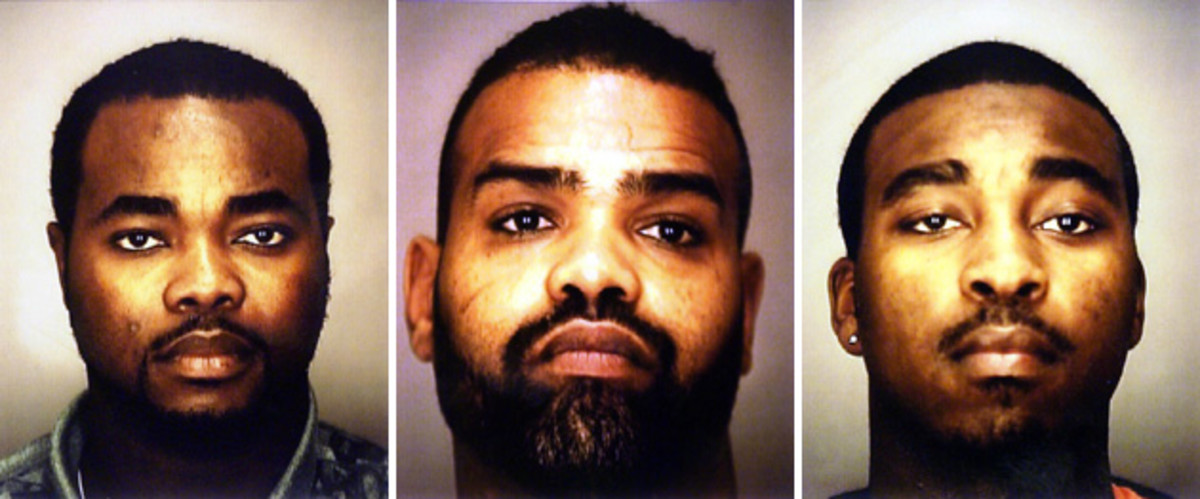
Four of the five bullets had found their mark. Three lodged in her flesh without serious harm. But one left a trail of destruction. It pierced her left side and passed through her abdomen, crossing her right chest, coming to rest near her right armpit. Along the way it tore her stomach and large intestine and made innumerable holes in her small intestine. It penetrated her liver, her diaphragm, her lung. It cut her pancreas in half. It severed the splenic artery and vein, opening such a fountain of blood that she eventually lost it all, and more. The tireless doctors at Carolinas Medical Center kept replacing the blood through intravenous lines, and she kept losing it. Six liters. One hundred fifty percent.
Nearly 70 minutes passed from the time of the shooting until the boy was delivered by emergency C-section.
The lethal bullet missed the boy, just as the four other shots did. It missed his mother's uterus by an inch or two. But her blood was his blood. It flowed through the uterine artery to the placenta and gave him the nutrients and oxygen he needed to live. Now the blood was diverted. It was pooling in his mother's chest. And the unborn child began to suffocate.
Nearly 70 minutes passed from the time of the shooting to the time the boy was delivered by emergency C-section. Ten more and he might have been stillborn, according to Docia Hickey, the neonatologist who helped save his life. But the effects of those 70 minutes would be irreversible. Without oxygen, cells began to die in his cerebellum and basal ganglia. There was tissue death in the brain. The human body is quite adept at self-healing and regeneration. But lost brain cells are gone forever.
The boy came into the world, and he was blue.
Saundra says she found her daughter after the C-section in one of her last moments of lucid speech, and she asked Cherica a question.
Do you want him to be a Carruth or an Adams?
Adams, Cherica said.
And so the blue boy became Chancellor Lee Adams.
When Carruth came to the hospital, bringing another girlfriend, he never asked Saundra how Cherica was doing. But according to friends, he asked repeatedly about the baby. Sometime after Chancellor's vital signs stabilized, Carruth got a picture of him and showed it off to a friend.
He's long, like me, Carruth said proudly. Like I was when I was a child.
Anyone could see it. The boy had Cherica's eyes, but otherwise he looked a lot like RaeCarruth.
A week passed. On Nov. 25 the police rounded up Carruth and three other suspects: Van Brett Watkins (New York), Michael Kennedy (Little Man) and Stanley Abraham, a friend of Little Man's who was in the car that night. All were charged with multiple felonies, including attempted murder and intent to kill an unborn child. Carruth was released on $3 million bond.
At first the Panthers were cautious, noncommittal. Coach George Seifert said Carruth was excused with pay and that the team didn't have "a particular timetable" for his return. Asked about Carruth's absence, fellow receiver Muhsin Muhammad said, "It's no difference for me." The team placed Carruth on a leave of absence without pay on Dec. 2. Meanwhile Chancellor got better, and his mother got worse. Her organs were failing. A judge was seen on the local news raising the possibility that the boy would be put in foster care.
But that never became an issue. Saundra Adams hired a lawyer, Billie Ellerbe, a tough customer with a wedge-shaped gray beard. She directed him to draw up some paperwork.
On Dec. 14, 1999, four weeks after she found the strength to make the call that saved her unborn son's life, Cherica Adams died. Just before the end, Saundra lay down beside her daughter. "I love you," she said. And Cherica left just the way she had come, in the grasp of her mother's hands.
Within an hour or two, Saundra's lawyer had filed a motion in Mecklenburg District Court. By the end of the day a judge had signed an order granting Saundra Adams emergency custody of her grandson. She would carry a child for her daughter after all.
*****
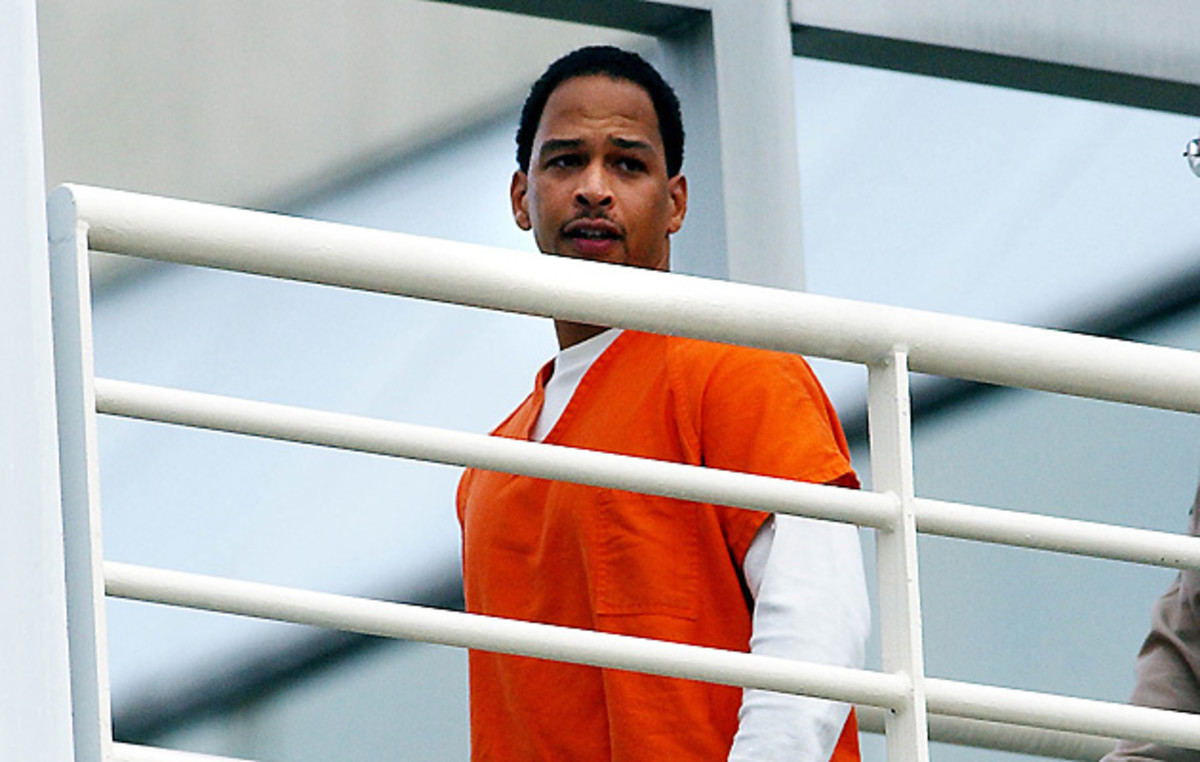
Now he wanted his son.
Now that his first plan had failed: Cherica quietly visiting an abortion clinic.
Now that his second plan had failed: Cherica beaten and hospitalized, the boy stillborn.
Now that his third plan had failed: Cherica and the unborn child both dead in a dark hollow on a cold night.
Now that his fourth plan had failed: a bail-jumping escape in the trunk of yet another woman's car, with $3,900 in cash and bottles to hold his urine.
Now that he'd been caught by the FBI at a Best Western in Tennessee.
Now that he lived at the Mecklenburg County jail.
Now that he was charged with first-degree murder and faced the possibility of a state-sponsored lethal injection.
Now he wanted his son.
• MORE SI 60: Read ever story and Q&A in the collection
On Feb. 17, 2000, Rae Carruth's attorney filed an answer to Saundra Adams in Mecklenburg District Court. It was one of the more brazen counterclaims in the annals of U.S. jurisprudence: a demand for permanent custody of Chancellor Lee Adams. "The Defendant," the filing read, "is a fit and proper person to exercise care, custody and control of the minor child and it is in the best interest and welfare of the minor child that his care, custody and control be vested with the Defendant at the conclusion of the Defendant's legal proceedings."
Chancellor's face, with his father's skin and his mother's eyes, lights up with joy when he sees his grandmother.
No, it wasn't enough that Saundra Adams had to spend 28 days watching her only child die. Had to watch her grandson spend the first six weeks of his life in a tangle of wires and machines. Had to become a single mother again at age 42. Had to hide from reporters day and night. Had to worry about more than $400,000 in medical bills that her descendants had racked up while fighting for their lives. None of that was enough. Now she would have to draw from the little time and energy and money she had left and fight to keep the sole remaining heir to the Adams name away from the man who had wanted him dead.
Carruth hired David Rudolf, one of the most prominent attorneys in North Carolina. He retained two more lawyers, Bill Diehl and Katie Holliday, a child-custody dream team, and they brought in Jonathan Gould, an expert in forensic psychology and parent-child relationships. Dr. Gould testified that those he interviewed found Carruth to be a sensitive and caring man, and that Chancellor, as with all infants, would benefit from physical contact with his father as soon as possible. Thus, a visit to the county jail would be in the best interests of the child.
The judge issued a ruling. Carruth's mother, Theodry, could take Chancellor from Saundra and show him to Rae through a pane of glass.
The Rabbit Hunter: A penetrating profile of Bobby Knight
For the first eight months of Chancellor's life, Saundra had been fanatical about protecting him. She declined interviews and refused to hand out pictures. When she took him out, she covered his stroller in a shroud. She never left him alone with anyone else -- not even her mother. And now a judge had sent the boy to jail to see the man charged with plotting his death.
Saundra prayed for Chancellor's safety. She had a King James Bible, a gift from her mother more than 20 years earlier, cover held together with tape, and it told her that the shield of faith would quench the fiery darts of the wicked. She prayed some more. And she found peace.
On Jan. 19, 2001, after a two-month criminal trial, the jurors delivered a split decision: They found Carruth guilty of conspiracy to commit murder, of using an instrument to destroy an unborn child and of shooting into an occupied vehicle, but not guilty of first-degree murder. That meant he would not face the death penalty. The judge had some leeway in determining his prison sentence, and Saundra Adams was called to testify.
"Chancellor has cerebral palsy because of this act," she said, facing the judge from the witness stand. "This heinous act. You know, thank -- we do thank God that he's still alive. You know, he is our miracle child. Because he was not supposed to be here if that plan had been implemented properly. But Chancellor is alive, and he's got such a strong will. Just like his mom. He is fighting for his life."
She went on, her voice gaining force.
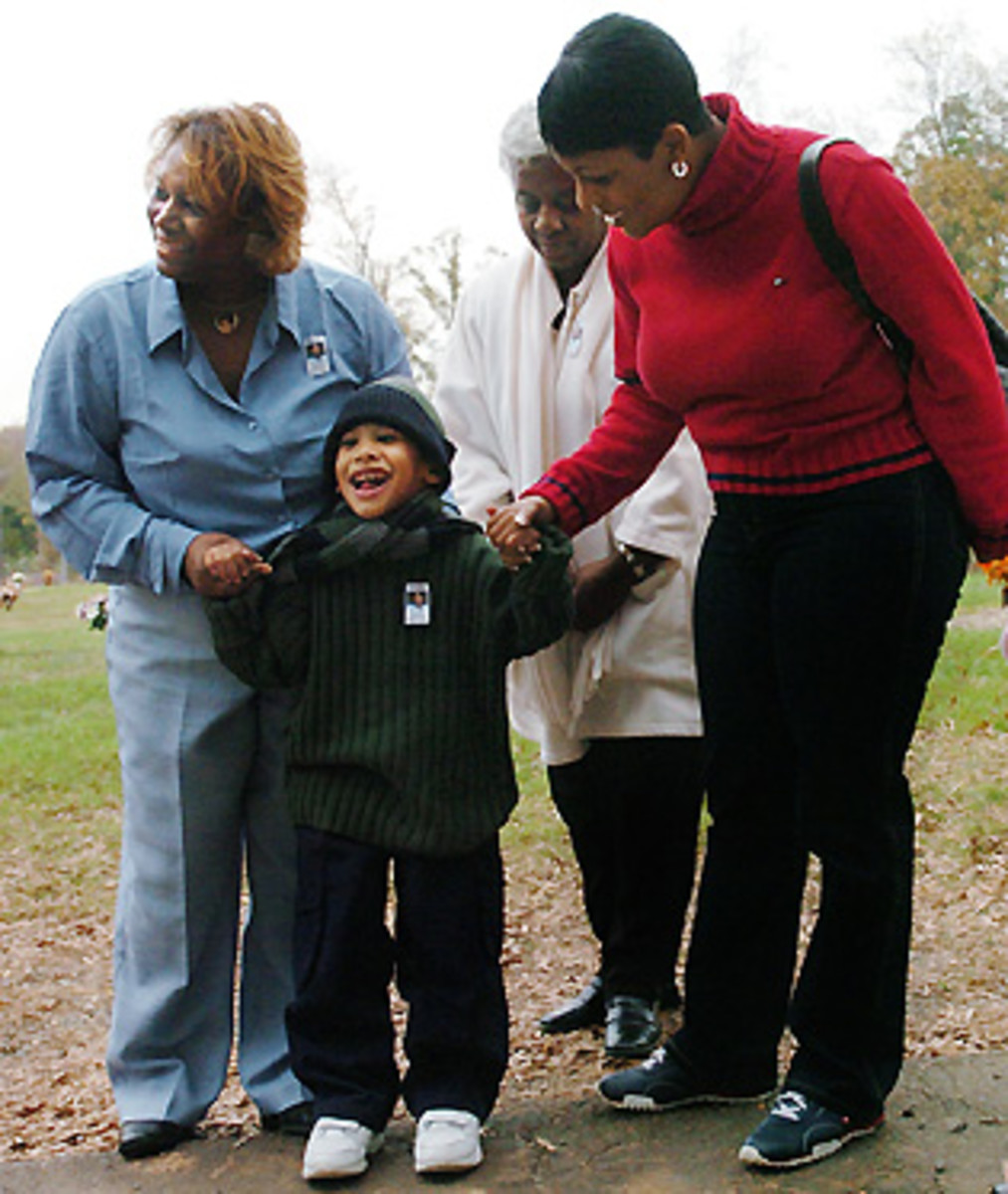
"Every day. I see that in Chancellor every day. Chancellor at 14 months old is not even doing the things that some four-month-olds do. Chancellor can't hold onto this ball. Chancellor can't pick up a spoon and hold a spoon."
Her voice rose to a place of righteous fury.
"He has trouble even holding a rattle in his hand and rattling. He's not sitting up. Talk about first step -- he can't even, he's not even near a point of taking a first step. The doctors are telling me that he might not even take a first step till he might even be three years old, or older. But yet Chancellor has such a strong will and such a great personality. And that's the trait that I hope --maybe he did get some of that from his father.
"Because I do believe in miracles, I know that Chancellor will be better. We're gonna give him lots of love, and I know that God is, is working things out already for him to be totally and completely well. And in my heart, even though RaeCarruth has not shown one single ounce of remorse, to me or anyone in my family, there's not been one 'I'm sorry about what happened to your daughter.'
"But in my heart, because I'm a Christian, as an act of my will, and because I know it's out of obedience to God, I am forgivingRaeCarruth."
*****
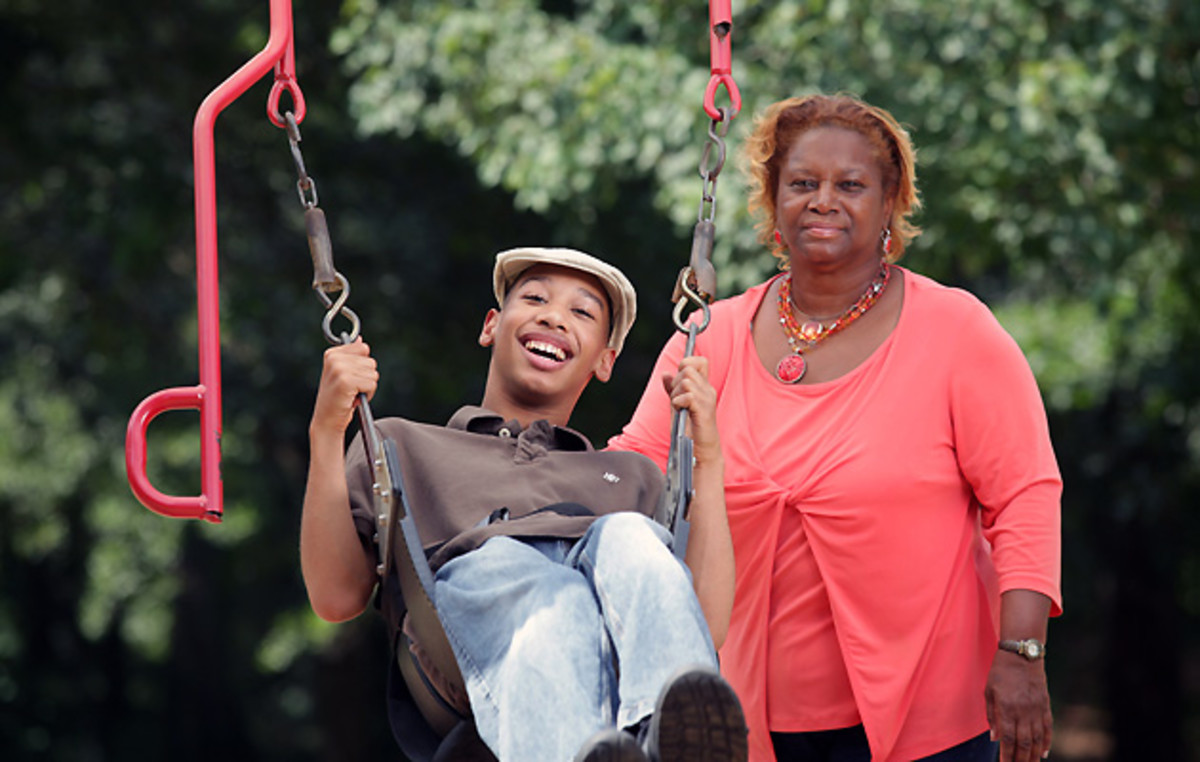
Eleven years later. Hot day in June. You wait in a T.G.I. Friday's on the north side of Charlotte, looking through the glass toward the parking lot. A metallic-blue minivan pulls into the handicapped-only space by the front door. She gets out of the driver's seat and comes around to the near side. The sliding door opens, and you see him for the first time.
It's hard to say what makes you cry. His face, perhaps, with his father's light skin, his mother's dark lashes and deep brown eyes, lit up with joy when he sees his grandmother's face. Or his body, slim and muscular, athletic if not for the hands that curl inward and the right leg that won't stand straight. Or the way her hand rests on his back as she guides him across the asphalt. Or the way he walks, lurching, as if his skeleton were a rusty machine.
They come inside the restaurant and sit down. She orders him water and a bowl of lemon wedges and makes him free lemonade with the juice of six wedges and a packet of Sweet'N Low. The waiter also brings free chips and salsa, courtesy of her Friday's loyalty card. Free is good for a 54-year-old single mother with a 12-year-old who still must crawl to get up and down stairs. "Want some chips?" she asks the boy.
"Yee-ahh," he says.
She dips a chip in the salsa and guides it to his open mouth.
"You like to talk about Mommy Angel, don't you," she says. "That's why we're here today. We're gonna talk about Mommy Angel. O.K.?"
"Yee-ahh."
"You know she loves you so much, right?"
"Yee-ahh."
To Chancellor, Saundra is G-Mom. Cherica is Mommy Angel. G-Mom talks all the time about Mommy Angel. She keeps pictures of Mommy Angel everywhere. She has even told Chancellor -- or Lee, as she now calls him, so he can say and spell his name -- a streamlined version of Mommy Angel's story, which is, of course, his own story.
"Well," G-Mom says at the table, "he knows that Mommy was killed, and that Daddy did, you know, Daddy did a baaad thing. And he's in jail right now paying for the bad thing that he did. And we just say that he, you know, he made a mistake. Right?"
"Yee-ahh," Lee says.
"Yeah," G-Mom says. "We wanna say he made a mistake. He did a bad, bad thing. And he hurt Mommy."
"Yee-ahh," Lee says.
"Yeah. It's O.K., baby. It's O.K. --"
She stops, because Lee is interrupting her with a question.
*****
Forgiveness is a skill, like any other, and RaeCarruth and his representatives have given Saundra Adams a stunning amount of practice.
The murder was only the beginning. Then, of course, there was the demand for custody, the team of experts, the court-ordered jailhouse visit and, after the conviction, a nationally televised interview that poured salt in the wound. Carruth explained the murder with the same convoluted story that he had offered at his trial -- in short, that he agreed to fund a drug deal with Little Man and New York, and the deal fell through, and New York was so furious that when he found Cherica alone on a dark road and she refused to help him track down Carruth, he shot her in a fit of rage. Even if you believe every implausible word of that story, you must also conclude that Carruth bears some responsibility for Cherica's death. He kept these dangerous criminals around. But when Leslie Boghosian of CNN/SI asked him about his association with the men who killed Cherica and left his son with brain damage, these were the first words out of his mouth: "I feel guilty about none of it."
And when asked if he had anything to tell Cherica's family, he said nothing about being sorry for their loss. Instead he said more about himself, and how, if the Adamses would get to know him, they might start "pulling for me" to get his conviction reversed.
He had a chance to make himself known two years later, on Aug. 13, 2003, when Saundra and Ellerbe drove 200 miles to see him at the Nash Correctional Institution in Nashville, N.C. Ellerbe was there to take Carruth's deposition in Saundra's wrongful-death suit against Carruth and his henchmen. Saundra believed Carruth couldn't be all bad if her daughter had loved him. She wanted to look him in the eye and hear him tell the story of Cherica's last night.
ELLERBE: This is a deposition and -- are you familiar with what a deposition is?
CARRUTH: Sir, I'm not going to answer any questions.
ELLERBE: A deposition is where I ask you questions and you answer the questions. Are you represented by counsel?
CARRUTH: I believe I can go; I've already told him what I was going to do.
ELLERBE: Are you represented by counsel?
CARRUTH: I can't answer that question either.
It went on like that for five minutes. Saundra looked at Carruth expectantly the entire time. He would not look at her.
Was it over then? Could she forget about him and move on, unhindered, to the task of mothering his son?
No.
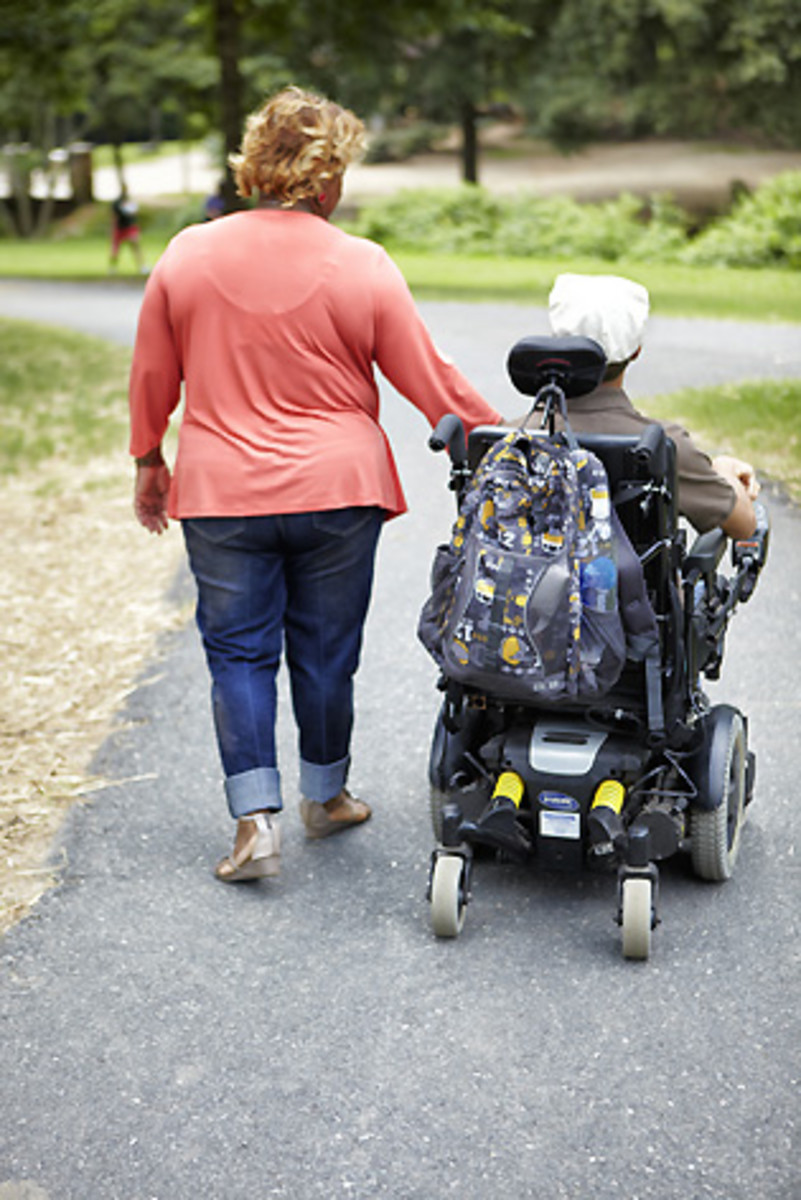
By then she had been awarded permanent custody of Chancellor Lee, but the legal battle continued. Carruth's mother, Theodry, kept complicating matters. Her lawyer took gestures of kindness Saundra had made to Carruth -- writing to him in prison, sending him pictures of his son -- and threw them back at her in court, arguing that "she's having a relationship with Mr. Carruth" and thus giving the judge more reason to award Theodry more access to Chancellor. After the judge said "there is no set of imaginable facts whereby Ms. Carruth can prove that Chancellor has been adversely affected by having [only] limited contact with Ms. Carruth," and thus dismissed her motion to intervene in 2004, Theodry appealed all the way to the North Carolina Court of Appeals. The battle continued until Aug. 25, 2006, when Chancellor Lee was almost seven, and a judge denied Theodry's last appeal.
In 2004 a judge found RaeCarruth liable for the wrongful death of Cherica Adams. He was ordered to pay Saundra $5.8 million in damages. But Carruth had little or no money left by then, so it was one more debt that Saundra had to forgive.
Meanwhile, Carruth and his lawyers fought on a third front. From 2001 to '11, from the North Carolina Court of Appeals to the North Carolina Supreme Court to the U.S. Supreme Court, back down to Mecklenberg Superior Court and back up to the U.S. Court of Appeals for the Fourth Circuit, Carruth appealed his conviction with the same basic argument: The jury members had been contaminated by the last words of Cherica Adams, who could not be cross-examined. At various times his lawyers said that the jurors should not have heard the 911 call, in which she placed him at the scene of the crime, and they should not have heard from the police officer who said Cherica had nodded when asked if her boyfriend had done this, and they should not have seen the notes she wrote while in a hospital bed with a breathing tube down her throat, in which she said that Carruth "blocked the front and never came back." But as the North Carolina attorney general argued in one filing, letting Carruth benefit from Cherica's absence "would, in effect, reward him for participating in her murder."
Saundra shrugged it off. "I didn't expect anything less from the lawyers," she said this summer, a year after the Fourth Circuit Court of Appeals affirmed Carruth's conviction. "There was nothing they were gonna do to silence the truth."
Carruth, who declined to be interviewed for this story, remains in prison. He behaves well and serves as a barber to other inmates. He is on track to serve the minimum time in his sentencing range of 18 to 24 years. His projected release date is Oct. 22, 2018.
"You know," Carruth said in the 2001 CNN/SI interview, "when the time comes and I do get to talk to Chancellor, I'll sit him down and I'll tell him what happened. Not what the media believes happened, not what Watkins and Kennedy says happened, but what actually happened that night and how I felt about him and how I was there for him and wanted to be there for him. To give him an understanding and a fair representation of what happened through the pregnancy and that night. And I believe he's going to be all right with it."
Daddy did a bad thing.
Daddy made a mistake.
Daddy hurt Mommy.
Carruth will not concede this. His public words and actions over the past decade are those of a man who wants to get out of prison, find his son and rewrite in his damaged brain the story of Daddy and Mommy Angel.
*****
They hurtle down I-77, singing Gospel music together, and he sways from side to side, and his voice is a fervent and joyful moan. They visit his godmother, Judy Williams, who feeds him fried potatoes and onions, and then they go to physical therapy, where his therapist, Amy Sturkey, is teaching him to walk on his own.
"Work those hips for me, Sweet Pea," she says as he bounces on a small trampoline. "Tell that hip to come over and join the party."
She stands by him, and he starts to fall, and fear shows on his face, because he can't catch himself, because his brain was damaged in those minutes when his mother's blood was diverted, but now Sturkey catches him, and he smiles again. He won't quit. Step up, step down, right, left, deathly serious, neck bulging with the effort, jerking like a baby and bent like an old man, so easy to damage, so hard to repair, and when he is done his grandmother holds him, his breathing soft but deep, and she whispers in his ear.
"Rest on G-Mom's shoulder a little bit."
Higher Education: How Perry Reese Jr. changed an Ohio community forever
And he does, and soon they're off to another structured activity, this time in a church gymnasium with the Allegro Foundation, where children with autism, Down syndrome and cerebral palsy gather to play and learn. Could he have run the 40-yard dash in 4.29 seconds like his father? Could he have caught a deep pass over the middle in the NFL? A teenage volunteer throws him an orange beach ball, pillow-soft, over and over from three feet away, and RaeCarruth's son can catch it only half the time.
An athlete? Yes, Chancellor Lee Adams is an athlete. He won a gold medal last April, in the 30 meters, in a motorized wheelchair, at the Mecklenburg County Special Olympics.
A football player? Yes again. Last year at a park in Charlotte he played in a flag football game with other kids of similar ability. Someone tossed the ball in his lap and he took off in that motor chair with the flag trailing behind him. Every few yards he would stop, and the defenders would close in, and G-Mom would yell, Keep going! Keep going fast! And he would go again, just out of their reach, and stop again, and go again, and finally G-Mom ran to him and the coaches ran to him and he smiled and laughed with delight because he could tell from their reactions that he had done something very good. And that good thing turned out to be a touchdown.
His grandmother leaves the gym for a moment, for a respite from all that intensity, and he sees that she is gone. He turns to you, sensing that you must know something, and he looks into your eyes. And he holds the eye contact without fear or shame. The purity in his gaze is astonishing, like a clean white flame, and then he asks that question again.
She could have filled him with hate, for his father and his Carruth blood; or anger, for the loss of his mother; or bitterness, for the loss of who he could have been. She filled him with something more powerful. He hardly ever cried as a baby, so quick was she to feed him and hold him and change his diapers, and as time went on he seemed to cry only for others. He would cry if one child hit another child, or at the suffering of a movie character, or when his godmother had a nosebleed. When G-Mom had food poisoning, so severe she had to crawl along the floor, there he was, crawling beside her.
She taught him that the rain was a shower of God's blessing, and he believed her, so that when his schoolmates ran inside to stay dry he just stood there and let it fall on him. She taught him that he could do anything, that he had no limits, even though a neurologist told her he would never walk or talk, and now of course he can do both. He can ride horses. He started sixth grade at the end of August. He makes his bed and cleans his room without being told. He wakes up smiling and goes to sleep smiling and in between he looks like the happiest person in the world. On the spectrum of cerebral palsy, he is somewhere near the middle. Conventional wisdom says he will always need help, always be catching up, never quite get to normal. But you never know. Medical technology is advancing. He runs through his therapy with a blazing intensity, and Sturkey thinks he could one day dress himself, prepare his own meals and walk safely around his own home. His grandmother believes he will get a job, get married, prolong the Adams bloodline and do many other amazing things. It may not be wise to bet against her.
They're in the minivan again, driving toward home. You want to go with them, but she will drop you off at your hotel instead. She is polite but firm. The home is Lee's sanctuary. No strangers allowed. It's late afternoon now, the heavy air draped over the Piedmont like a blanket pulled too soon from the drier, and Saundra Adams is talking about RaeCarruth.
"I'm not gonna have anything negative to say about him," she says. "I thank him for my grandson. I thank him for my grandson."
There is a long silence.
"After what you've lost," you say.
"Like I say," she says, "you can focus on what you've lost or what you have left. So I didn't lose. I have my grandson. I have my daughter with me in my heart, always. I have her with me through Lee. So I don't focus on loss. I mean, I think she's in Heaven, with God, so that's definitely not a loss. So I've got a lot left, and a lot of hope left, and a lot to live for, and to be able to help my grandson to become the wonderful man he's meant to be. I haven't lost anything.
"Really, I've gained. I've been pushed into my role and destiny."
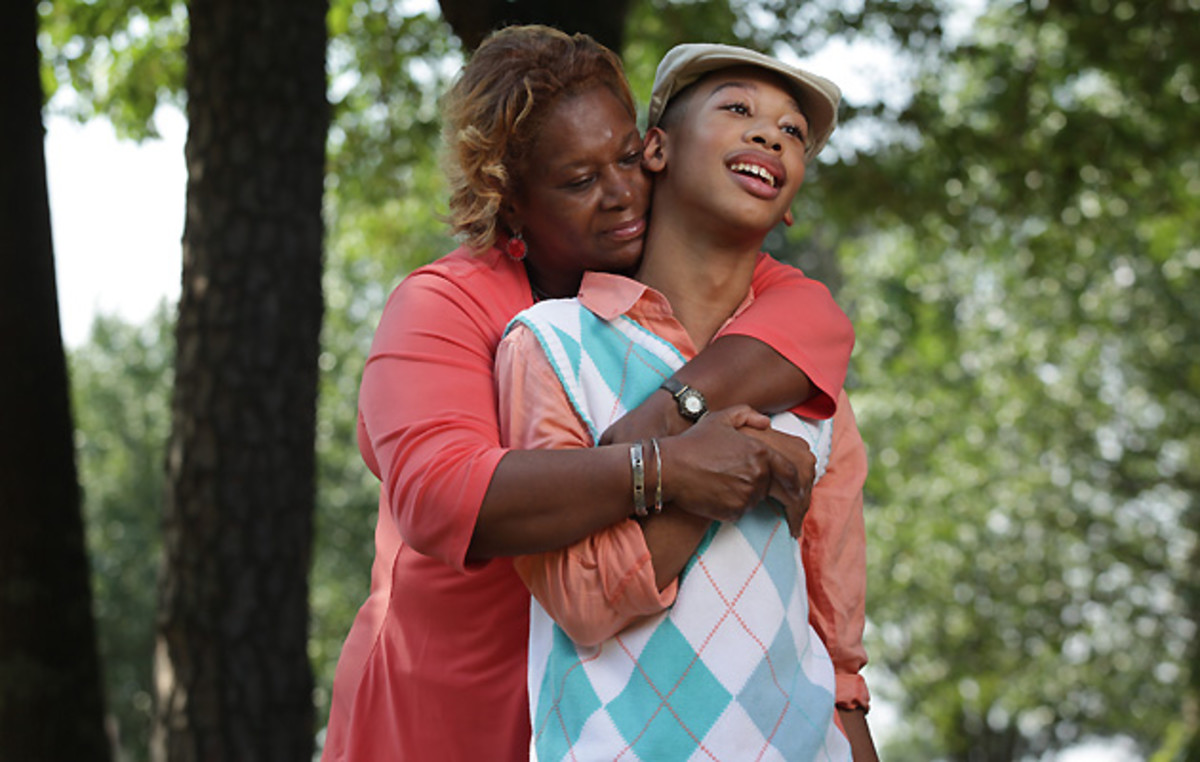
*****
It's coming, this meeting of father and son. Saundra will not try to stop it. She is not afraid of him. When RaeCarruth brings his story she will be there too.
Lee will have grown a lot by then. He will probably be taller than his father. And so, if they stand face-to-face, Rae will have to look up at him, into a mirror, at his own face, and into the eyes of the woman he put to death, and into the eyes of a third creature, a man, not a boy, with that gaze of pure white flame, and these three people will almost certainly ask him a question. It is Lee's favorite question. He asks it all the time, about almost everything. He asked it in T.G.I. Friday's and he asked it in the church gymnasium. And now the man who would not be killed will look at the man who could not kill him, and he will ask it one more time:
Why?
